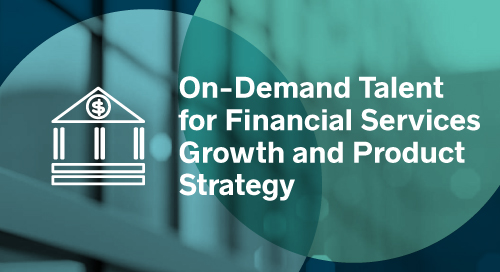
It goes without saying that the pandemic has had an indelible effect on how we live our lives, do our jobs, and run our businesses. The sheer number of ways in which we, as a society, have had to suddenly shift priorities and adjust our goals has primed us for transformation and growth. This is just as true for the global business economy as it is for us as individuals, and it’s the industry that connects us all—the banking sector—that is positioned for the biggest changes.
That said, “transformation” and “growth” are relative—and for businesses, they can be double-edged. The doors of opportunity opened by the pandemic were also exit signs for much of the workforce, leaving functional leadership gaps and a banking talent shortage. So while the future of banking is bursting with potential, executives are simultaneously scrambling to address the “Great Resignation” and its growing effect on that very potential.
New demands reveal new paths — and new problems
After proving their resiliency in the face of unprecedented uncertainty, today’s banking leaders continue to press on into uncharted territory, from navigating continuous technological developments to overhauling their strategies to address the burgeoning digital assets market.
Driven by these myriad new demands, many have already begun tackling a wide array of large-scale change and transformation initiatives, particularly in the areas of product innovation, customer acquisition, and service. Similarly, rapid growth, process improvement, and automation have become top priorities, further accelerating a parallel need to better address risk management and regulatory compliance.
Hesitation is a liability right now, but full steam ahead is only well and good if you have enough of the right people in place to support initiatives like these. The problem is: the banking talent pool is shrinking, and the competition for quality talent has become cutthroat.
Upheavals in the workforce
How and where work gets done has changed significantly over the past two years, and as a result, so has the entire hiring landscape. Whether you call it the “Great Resignation,” the “Great Realization,” or the “Great Reshuffle,” one thing is clear: it’s not great news for employers.
Despite its decidedly bullish outlook as the pandemic started to recede, Wall Street is now finding its cushion steadily deflated by the pressure of rising wages. Early this year, the Wall Street Journal reported that compensation expenses for Goldman Sachs Group Inc rose by 33% in 2021, with the additional $4.4 billion in payroll leading to a 4th quarter profit decline. JPMorgan Chase spent an additional $3.6 billion and Citigroup $2.9 billion, similarly leading to an erosion of Q4 profits.
Wage inflation is just part of growing workforce concerns for the future of banking, however. Experienced professionals are also being wooed away from traditional finance by the allure of blockchain and crypto companies.
A recent survey by Heidrick & Struggles found that nearly 75 percent of new blockchain and crypto executives came from investment banking and other financial services backgrounds. Nearly a third left their previous jobs to found their own companies, while 20 percent more were actively recruited. This reveals that many are willing to trade the security of customary roles for the experimentation and learning opportunities offered by an emerging market.
Flexibility is high on executives’ priority lists, too. They want to work where and when they want, which meshes well with the nontraditional work arrangements offered by many crypto startups. They also express a desire to shed layers from institutional decision-making processes so they can move more quickly and have a stronger impact. Overall, the theme is one of seeking roles that fit better with personal objectives. Preferences have become priorities.
Traditional banking is attempting to remain attractive to top executives through increased compensation, but providing intangible benefits related to personal and professional growth remains a challenge. As a result, the banking talent gap is growing. That is why more and more banking leaders are turning to on-demand talent—who find flexibility and professional control by working independently—for support with changing and running their businesses.
Changing the Business with Strategic Growth
Historically, on-demand talent has comprised a fraction of the banking workforce. PwC says this is changing, however: “In the next five years…this pool is forecast to take on as much as 20 percent of the workload at most financial institutions. More than half of financial services (52 percent) surveyed by PwC said they plan to expand their on-demand talent in the next three to five years.”
With deep expertise, hands-on operating experience, and the ability to hit the ground running, high-end independent talent enables banks of all types—from diversified, multinational firms to regional/midcap banks—to access the in-demand skills and expertise they need for critical initiatives. By bringing in highly experienced on-demand talent to fill banking talent gaps, executives can augment their existing teams with targeted support for strategic planning, regulatory impact assessments, business rationalization, and organic/inorganic growth initiatives.
Case in point: Expansion of Services
For example, when a top 30 US bank was looking to expand its retail banking arm, company leaders knew it would be essential to create a common vision and alignment across the retail business. Their own team lacked a strategy and transformation leader to achieve this, however, so they reached out to Business Talent Group (BTG) for support.
BTG provided a transformational enterprise technology leader with deep B2B SaaS experience and proven record delivering sales leadership, product enhancements, and client services for large financial institutions. He was able to not only drive effective transformation alignment around a cohesive strategic vision; he also created infrastructure for improved talent assessment and hiring to eliminate current and future talent gaps.
Case in Point: New Markets
In another instance, the corporate strategy team at a top 20 US bank was charged with implementing a mortgage origination strategy work plan to support the organization’s goal of quintupling its annual mortgage business. This task uncovered a critical knowledge gap, as the team had limited mortgage experience. They would need a hands-on growth strategy consultant with relevant industry expertise, so they turned to BTG.
Within three days, BTG delivered a former banking executive and PwC and Accenture financial services consultant with 15+ years’ experience working with residential mortgages and expertise in strategy analysis, go-to-market strategy, and market assessment. Eight weeks later, the team had a go-to-market strategy as well as an execution roadmap and P&L model for implementation.
In both cases, urgently needed talent was able to be sourced and embedded within days, rather than the months it can take to hire a full-time candidate. Critical objectives were efficiently accomplished within a matter of weeks, speeding each organization’s growth in an increasingly competitive landscape.
Changing the Business by Transforming It
In recent years, the most globally relatable catalyst for business transformation has been the pandemic. But like many industries, banking institutions have also begun to pursue transformation initiatives to keep up with (and, ideally, get ahead of) continuous technological advancements and establish competitive advantages in new markets.
Digitization and software rollouts also require careful project management, each requiring market-specific strategic roadmaps and implementation planning. Meanwhile, company events such as post-merger or acquisition integrations and corporate spin-offs carry their own administrative burdens and requirements for niche subject matter expertise. In all cases, time is of the essence, as speed to market can be the difference between innovating and emulating—and, in instances of M&A, it can directly affect company culture, further exacerbating talent retainment concerns.
Fortunately, transformation and program management are other areas where high-end talent can be brought in on an on-demand basis, helping to smooth transitions and facilitating efficient program rollouts. Experienced consultants can even be brought in in the middle of projects to right the ship and regain ground.
Case in Point: Interim Transformation Leadership
When a project to make a major regional US bank’s technology more scalable and efficient fell behind schedule, the bank’s head of innovation realized the team lacked the technical expertise to lead the initiative.
BTG brought in a technology transformation leader whose 20 years of experience with CRM programs, agile methodologies, implementation, and leadership allowed him to immediately jump in and get to work. Within six months, BTG’s consultant was able to execute a successful CRM roll-out and deliver a high-level training roadmap to strengthen the team moving forward.
Running the Business with Targeted Banking Talent
A recent report by PwC found that industry leaders are currently evaluating “which roles need to be performed by permanent employees and which can be performed by gig-economy workers, contractors, or even crowd-sourced on a case-by-case basis.”
Once limited by geographic location, the massive shift to remote working during the pandemic has “opened the door to accessing talent outside of a firm’s physical location,” says John Garvey, global financial services leader at PwC US. This door opens onto a global stage, granting banks greater access to highly talented interim executives outside their respective countries.
This, in turn, has created a more robust pool of specialized on-demand talent in financial services. Once-finite strategic initiatives are no longer hampered by an inability to fill functional leadership gaps locally. What’s more, organizations are able to experiment with new roles and projects by taking a “try-before-you-buy” approach.
Case in Point: Piloting Process Improvements
Acquisitions bring with them an immediate need for uniformity across formerly disparate processes. Most of the time, there’s no preexisting in-house leadership for such an initiative. This was the case when, after a series of acquisitions, a commercial bank needed to standardize its back-office loan processes.
Rather than hiring a full-time financial strategist to define and execute these time-sensitive process improvements, the SVP of Process turned to BTG. After a short diagnostic, the BTG strategist outlined key principles for servicing small business customers, designed a detailed end-to-end process that followed them, and created an implementation plan.
She then continued to work with the company on a part-time basis as the client began to execute. The organization was able to pilot both the project and the consultant while filling a critical knowledge gap, effectively saving time while mitigating risk.
The Future of Banking Remains Bright
It’s true that “The Great Resignation” has created a potential speed bump for the future of banking. As the 2022 Banking and Capital Markets Outlook from Deloitte asserts, “Employees, for the first time in decades, appear to have the upper hand, especially in sought-after positions.” At the same time, the global workforce’s increased desire for flexibility precipitated a permanent shift toward remote work that has increased the depth of talent available in an on-demand capacity.
Banking leaders now have unprecedented access to high-end, specialized banking expertise via on-demand talent networks such as BTG. Whether you need immediate support on an in-progress transformation project or need to fill critical knowledge gaps for on-deck initiatives, we help you drive growth, innovation, and performance improvement with in-demand skills, expertise, and interim executives. Find the talent you need today.
Get the Skills You Need
Thousands of independent consultants, subject matter experts, project managers, and interim executives are ready to help address your biggest business opportunities.
About the Author
More Content by Emily Slayton












